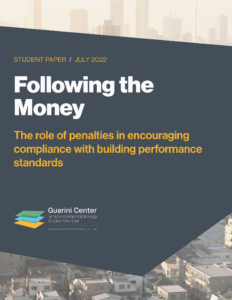In response to growing public concerns about climate change, many American cities have begun to set goals for reducing energy usage, decreasing reliance on non-renewable energy sources, and helping building owners upgrade inefficient properties. To aid in this transition, several jurisdictions have created Building Performance Standards (BPSs). BPSs regulate either greenhouse gas (GHG) emissions or energy efficiency for certain building types.
This paper, prepared by students at the New York University School of Law, surveys the field of existing BPSs, focusing on the different ways that jurisdictions have chosen to penalize non-compliance. It argues that penalties designed to make building owners internalize the costs of non-compliance with BPS targets are more likely to be effective than penalties based on a flat fee approach.
Authors: Nathan Lee (JD) & Corban Ryan (JD)
